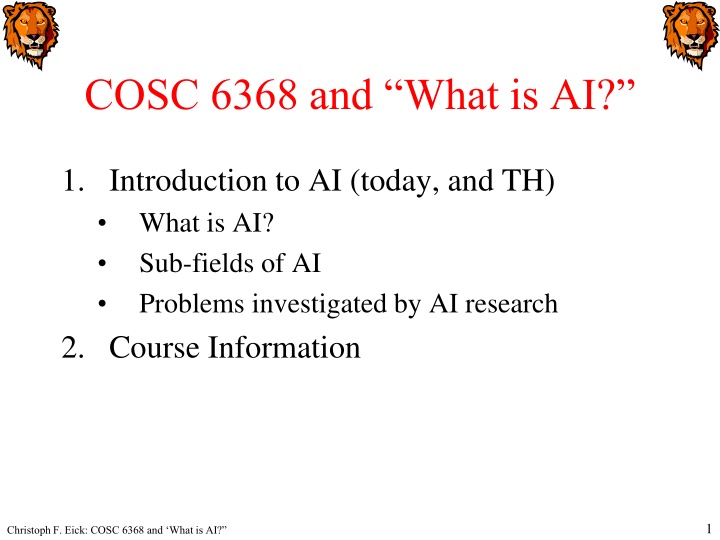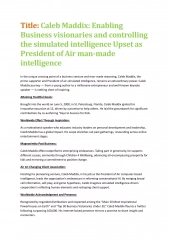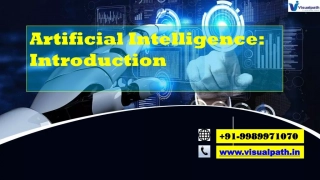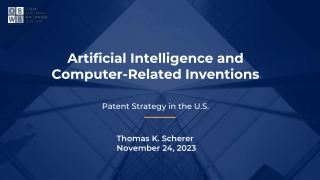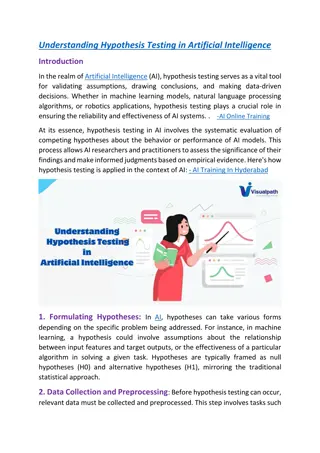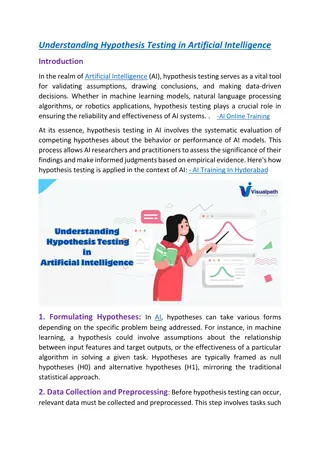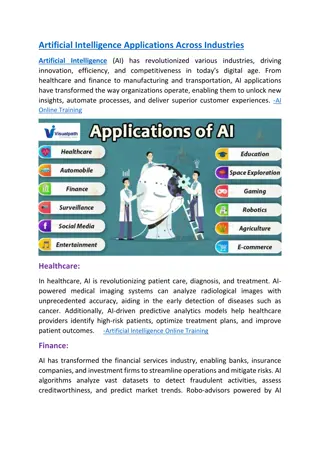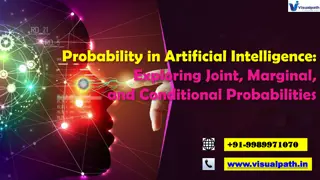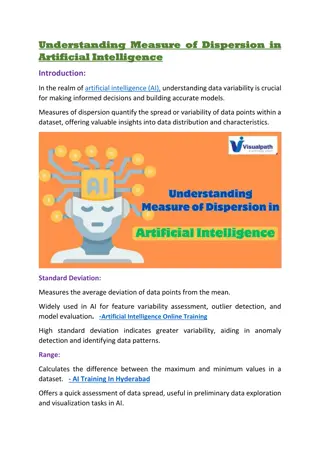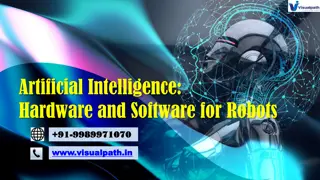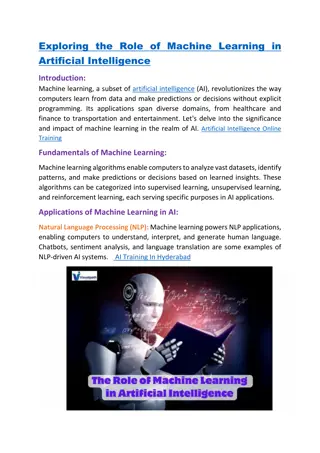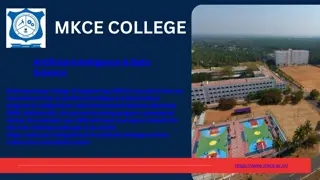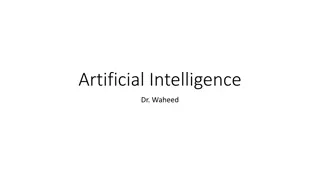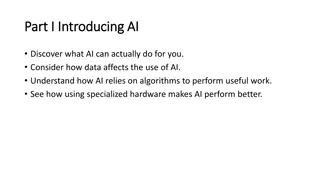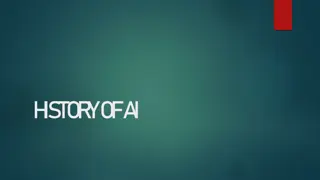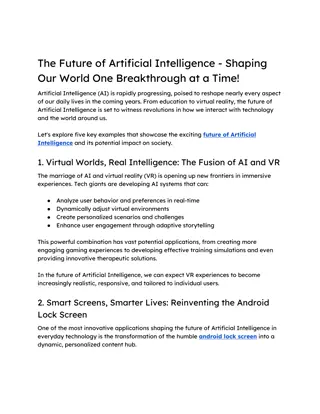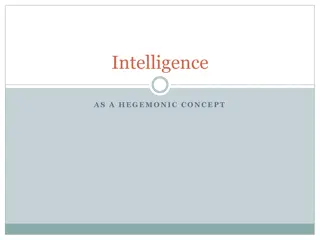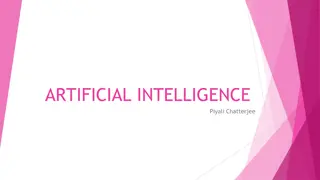Introduction to Artificial Intelligence: Definitions, Sub-fields, and Questions
Artificial Intelligence (AI) encompasses the simulation of intelligence using computers and explores various programming paradigms, languages, and tools. Sub-fields such as symbolic, heuristic, logical, and rule-based programming are investigated. Different definitions of AI by experts like Rich/Knight and Winston are highlighted, along with the Physical Symbol System Hypothesis. The text raises thought-provoking questions about the limitations and potential capabilities of AI and its implications for society and the future. It reflects on the evolving role of computers in various domains and the philosophical considerations surrounding AI's advancement.
Download Presentation

Please find below an Image/Link to download the presentation.
The content on the website is provided AS IS for your information and personal use only. It may not be sold, licensed, or shared on other websites without obtaining consent from the author.If you encounter any issues during the download, it is possible that the publisher has removed the file from their server.
You are allowed to download the files provided on this website for personal or commercial use, subject to the condition that they are used lawfully. All files are the property of their respective owners.
The content on the website is provided AS IS for your information and personal use only. It may not be sold, licensed, or shared on other websites without obtaining consent from the author.
E N D
Presentation Transcript
COSC 6368 and What is AI? 1. Introduction to AI (today, and TH) What is AI? Sub-fields of AI Problems investigated by AI research 2. Course Information 1 Christoph F. Eick: COSC 6368 and What is AI?
Part1a: Definitions of AI AI centers on the simulation of intelligence using computers AI develops programming paradigms, languages, tools, and environments for application areas for which conventional programming fails Symbolic programming (LISP) Functional programming Heuristic Programming Logical Programming (PROLOG) Rule-based Programming (Expert system shells) Soft Computing (Belief network tools, fuzzy logic tool boxes, ) Object-oriented programming (Smalltalk) 2 Christoph F. Eick: COSC 6368 and What is AI?
More Definitions of AI Rich/Knight: AI is the study of how to make computers do things which, at the moment, people do better Winston: AI is the study of computations that make it possible to perceive, reason, and act. Turing Test: If an artificial intelligent system is not distinguishable from a human being, it is definitely intelligent. https://en.wikipedia.org/wiki/Turing_test Eugene Goostman Winner 2014 Touring Test: https://en.wikipedia.org/wiki/Eugene_Goostman Please read: http://www.zdnet.com/article/beyond-cortana-what-artificial-intelligence-means-for-the-future-of-microsoft/ 3 Christoph F. Eick: COSC 6368 and What is AI?
Physical Symbol System Hypothesis What the brain does can be thought of at some level as a kind of computation Physical Symbol System Hypothesis (PSSH): A physical symbol system has the sufficient and necessary means for general, intelligent actions. Remarks PSSH: 1. Subjected to empirical validation 2. If false AI is quite limited 3. Important for psychology and philosophy 4 Christoph F. Eick: COSC 6368 and What is AI?
Questions/Thoughts about AI What are the limitations of AI? Can computers only do what they are told? Can computers be creative? Can computers think? What problems cannot be solved by computers today? Computers show promise to control the current waste of energy and other natural resources. Computer can work in environment that are unsuitable for human beings. If computers control everything --- who controls the computers? If computers are intelligent what civil rights should be given to computers? If computers can perform most of our work; what should the human beings do? Only those things that can be represented in computers are important. It is fun to play with computers. 5 Christoph F. Eick: COSC 6368 and What is AI?
Topics Covered in COSC 6368 More general topics: Expose to many search algorithm Probabilistic Reasoning Making sense out of data AI-specific Topics: reasoning in uncertain environments and belief networks Heuristic search, Constraint Satisfaction Problems, and Games Learning from examples and reinforcement learning brief coverage of planning, evolutionary computing, and maybe Robotics Exposure to AI tools (belief networks, decision trees, ANN) 6 Christoph F. Eick: COSC 6368 and What is AI?
2016 Organization COSC 6368 August 23+25: 1. Introduction to AI (covers chapter 1 and chapter 2 in part) 1.5 lectures August 25+30 September 1+8+13+15+20+22: 2. Problem Solving (covering chapter 3, 4 in part, 5, and 6 in part, centering on uninformed and informed search , adversarial search and games, A*, alpha-beta search, evolutionary computing, game theory (chapter 17 and other material), and solving constraint satisfaction problems, discussion course Project 1) 7.5 lectures September 27+29: 3. Planning and Acting (covering chapters 10 and 11 in part) 1.5 lectures September 29 October 4+6+11+20+25+27 Nov. 1: 4. Machine Learning (covering learning from examples (chapter 18), deep learning (extra material) and reinforcement Learning (chapter 21, chapter17 in part; Discussion Project2) 7.5 lectures October 20: Discussion of Homework1 and Review for Midterm Exam October 25: Midterm Exam November 1+3+8+10+15+17: 5. Reasoning and Learning in Uncertain Environments (covers chapters 13, 14, 15 in part, and 20 in part, centering on basics in probabilistic reasoning, na ve Bayesian approaches, belief networks and hidden markov models (HMM)) 5.5 lectures November 29: 6. Robotics (Chapter 25) 1 lecture December 1: 7. Course Summary, Discussion of Homework and Review for the Final Exam December 8, 2p: Final Exam 7 Christoph F. Eick: COSC 6368 and What is AI?
Positive Forces for AI Knowledge Discovery in Data and Data Mining (KDD) Intelligent Agents for WWW; multi-agent systems Robotics (Robot Soccer, Robot Waiters, industrial robots, rovers, toy robots ) Creating of Knowledge Bases and Sharing of Knowledge (especially for Science and Engineering) Computer Chess and Computer Games in General --- AI for Entertainment Automating human skills; e.g. driving; helping handicapped persons Speech Recognition, Image Annotation Internet of Things Deep Learning Intelligent this and that 8 Christoph F. Eick: COSC 6368 and What is AI?
6368 Homepage http://www2.cs.uh.edu/~ceick/AI16.html Algorithms Covered in COSC 6368 See Teaching Plan Word-file Textbook Code Repository https://github.com/aimacode IJCAI 2016 Homepage http://ijcai-16.org/index.php/welcome/view/home 9 Christoph F. Eick: COSC 6368 and What is AI?
Course Elements 23 Lectures 2 Exams (midterm and final exam) 2 Homeworks (review questions, exam style paper and pencil problems, and other small tasks that involve using AI-tools) Medium-size Course Projects: Project 1: Search/Games and Project2: Reinforcement Learning require programming; can use language of your liking. Discussion of homeworks 2 45 minute Reviews before the two exams Each student gives a short 3-5 minute presentation about something Will try to use demos and animations --- we have to see if this turns out to be useful; your input is appreciated! 10 Christoph F. Eick: COSC 6368 and What is AI?
Knowledge Representation Knowledge-based and Expert Systems Planning Coping with Vague, Incomplete and Uncertain Knowledge Searching Intelligently AI Logical Reasoning & Theorem Proving Communicating, Perceiving and Acting Intelligent Agents & Distributed AI AI Programming Learning & Knowledge Discovery
Part1b: Examples of Problems Investigated by Different Subfields of AI 12 Christoph F. Eick: COSC 6368 and What is AI?
Knowledge Representation Problem: Can the above chess board be cover by 31 domino pieces that cover 2 fields? AI s contribution: object-oriented and frame-based systems, ontology languages, logical knowledge representation frameworks, belief networks, semantic web 13 Christoph F. Eick: COSC 6368 and What is AI?
Natural Language Understanding I saw the Golden Gate Bridge flying to San Francisco. I ate dinner with a friend. I ate dinner with a fork. John went to a restaurant. He ordered a steak. After an hour John left happily. I went to three dentists this morning. 14 Christoph F. Eick: COSC 6368 and What is AI?
Planning Objective: Construct a sequence of actions that will achieve a goal. Example: John want to buy a house Characteristics of Planning: Goals and Subgoals Operators that potentially make goal predicate true Parallelism Dependency between goals / subgoals Plan and sub-plans might fail, requiring plan modification 15 Christoph F. Eick: COSC 6368 and What is AI?
Heuristic Search Heuristo (greek): I find Copes with problems for which it is not feasible to look at all solutions Heuristics: rules a thumb (help you to explore the more promising solutions first), based on experience, frequently fuzzy Main ideas of heuristics: search space reduction, ordering solutions intelligently, simplifications of computations Example problems: puzzles, traveling salesman problem, chess, 16 Christoph F. Eick: COSC 6368 and What is AI?
Figure 17 Christoph F. Eick: COSC 6368 and What is AI?
Evolutionary Computing http://www2.cs.uh.edu/~ceick/6367/6367.html Evolutionary algorithms are global search techniques. They are built on Darwin s theory of evolution by natural selection. Numerous potential solutions are encoded in structures, called chromosomes. During each iteration, the EA evaluates solutions adn generates offspring based on the fitness of each solution in the task. Substructures, or genes, of the solutions are then modified through genetic operators such as mutation or recombination. The idea: structures that led to good solutions in previous evaluations can be mutated or combined to form even better solutions. 18 Christoph F. Eick: COSC 6368 and What is AI?
Soft Computing Conventional Programming: Relies on two-valued logic Mostly uses a symbolic (non-numerical knowledge representation framework) Soft Computing (e.g. Fuzzy Logic, Belief Networks, Hidden Markov Models): Tolerance for uncertainty and imprecision Uses weights, probabilities, possibilities Strongly relies on numeric approximation and interpolation Remark: There seem to be two worlds in computer science; one views the world as consisting of numbers; the other views the world as consisting of symbols. 19 Christoph F. Eick: COSC 6368 and What is AI?
Different Forms of Learning Learning agent receives feedback with respect to its actions (e.g. using a teacher) Supervised Learning/Learning from Examples/Inductive Learning: feedback is received with respect to all possible actions of the agent Reinforcement Learning: feedback is only received with respect to the taken action of the agent Unsupervised Learning: Learning without feedback 20 Christoph F. Eick: COSC 6368 and What is AI?
Machine Learning Classification- Model Construction (1) Classification Algorithms Training Data Classifier (Model) NAME RANK Mike Mary Bill Jim Dave Anne YEARS TENURED 3 7 2 7 6 3 Assistant Prof Assistant Prof Professor Associate Prof Assistant Prof Associate Prof no yes yes yes no no IF rank = professor OR years > 6 THEN tenured = yes 21 Christoph F. Eick: COSC 6368 and What is AI?
Classification Process (2): Use the Model in Prediction Classifier Testing Data Unseen Data (Jeff, Professor, 4) NAME Tom Merlisa Associate Prof George Professor Joseph Assistant Prof RANK Assistant Prof YEARS TENURED 2 7 5 7 Tenured? no no yes yes 24 Christoph F. Eick: COSC 6368 and What is AI?
Knowledge Discovery in Data [and Data Mining] (KDD) Let us find something interesting! Definition := KDD is the non-trivial process of identifying valid, novel, potentially useful, and ultimately understandable patterns in data (Fayyad) 25 Christoph F. Eick: COSC 6368 and What is AI?
Flying SWARM Robots http://arstechnica.com/science/2012/03/robots-swarm-the-stage-at-ted/ Watch First 2 minutes. 4:30, 10:15. 15:30 Requires: Planning Multi-Agent System and Distributed AI Search Reasoning in uncertain Environments Machine Leaning Computer Vision Christoph F. Eick: COSC 6368 and What is AI? 26
2. General Course Information Course Id: COSC 6368 Machine Learning Time: TU/TH 2:30-4p Instructor: Christoph F. Eick Homepage: http://www2.cs.uh.edu/~ceick Office Hours TU 4-4:45p TH 12:45-2p TA Nguyen Pham Office Hours TU TH Classroom: CAM 101 E-mail: ceick@uh.edu / Christoph F. Eick: COSC 6368 and What is AI?
Prerequisites COSC 6368 Background In general, the course is self-contained Programming Some experience in writing programs with 200+ lines in some programming language (C, C++, Java, ) Basic knowledge of data structures (particularly trees and graphs); what is taught in an introductory undergraduate data structure course; e.g. COSC 2320 basic data structures, complexity No knowledge of LISP, PROLOG and other AI languages is required Ability to deal with abstract mathematical concepts Basic knowledge of probability theory is helpful, but I will give a very basic review early November COSC 4345 prerequisite will not be enforced Christoph F. Eick: COSC 6368 and What is AI?
Textbook http://aima.cs.berkeley.edu/ Christoph F. Eick: COSC 6368 and What is AI?
Grading 2 Exams 2 Homeworks 12% 2 Projects 30-32% Attendance and Extra Credit 2-4% Remark: Weights are subject to change 54% NOTE: PLAGIARISM IS NOT TOLERATED. Christoph F. Eick: COSC 6368 and What is AI?
Exams Will be open notes/textbook Will get a review list before the exam Exams will center (80% or more) on material that was covered in the lecture Exam scores will be immediately converted into number grades A few sample exams are available Christoph F. Eick: COSC 6368 and What is AI?
COSC 6368: Important Dates for 2016 October 15: Deadline Homework1 October 6: Deadline Course Project1 October 20: Review for Midterm Exam October 15: Midterm Exam November 18: Deadline Course Project2 November 28: Deadline Homework2 December 1: Review for Final Exam Th., December 8, 2p: Final Exam Christoph F. Eick: COSC 6368 and What is AI?
Questionnaires There will be a few questionnaires during the course of the semester, inquiring Your programming experience and what languages you use Background knowledge from other courses About your expectations What things you like/ do not like when taking a course (e.g. making presentations, group project ) What do you think about the graduate program you are part of? What do you expect from the graduate program you are part of? What is important for you as a graduate student COSC Graduate Committee Christoph F. Eick: COSC 6368 and What is AI?
Other Things There will be some group activities Project1 should be available on Sept.4, and Homework1 should be available on Sept. 22, the latest I am contemplating giving students small tasks that contribute to the course, and students will receive 2-3% credit for those tasks. Christoph F. Eick: COSC 6368 and What is AI?
